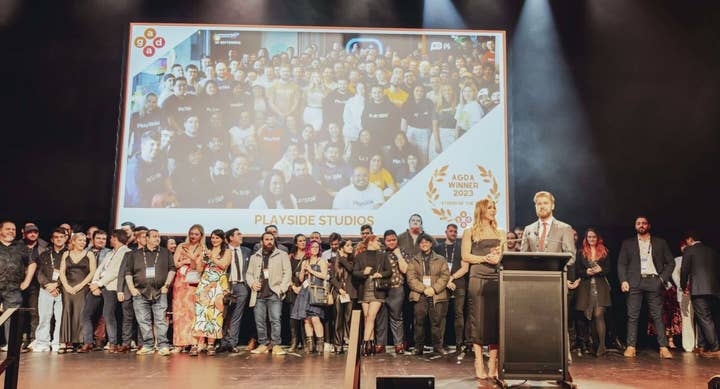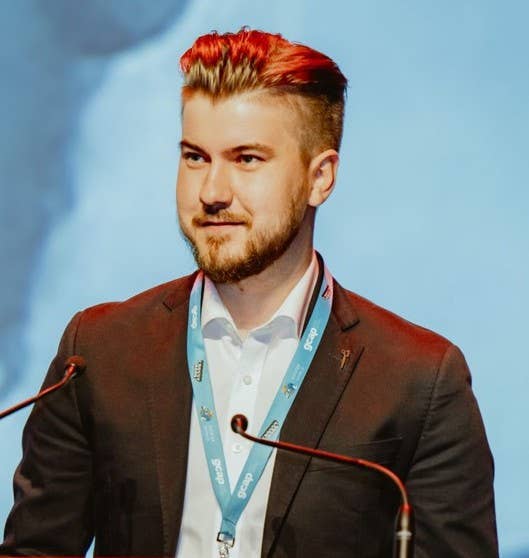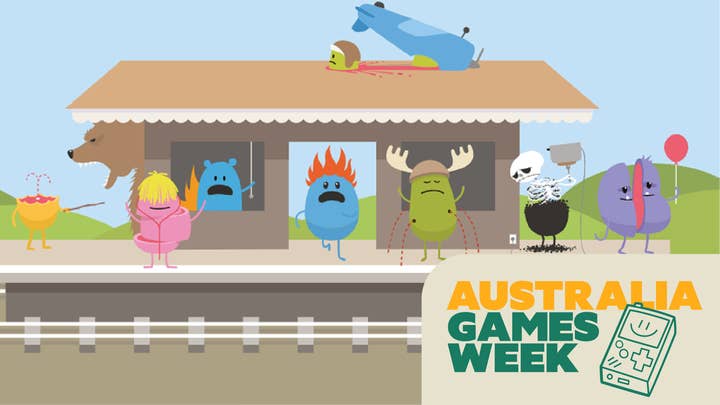PlaySide on growing Dumb Ways To Die: "We just passed Pokémon on TikTok"
Ben Kelly and Ryan McMahon on the studio's future in original IP and helping the next generation of Australian devs
PlaySide won Studio of the Year at the Australian Game Developer Awards last month, an achievement crowning over a decade in game development.
The Melbourne-based studio started in 2011 as a pioneer in the free-to-play mobile space, and has grown to become the largest independent games developer in Australia with over 300 staff, going public in 2020.
"We've worked with Disney, Warner Bros, Paramount, SkyDance, Nickelodeon, Cartoon Network," lists Ryan McMahon, general manager for PC and console at PlaySide Studios. "If there's a movie studio, we've probably worked with it!
"It really started with our CEO Gerry [Sakkas] and a couple of others who went to market with a game called Catch the Ark, which was an endless runner-style game, one of the first to iOS at the time. That opened the doors to contract work, and that's actually become a bit of an ecosystem that we have within PlaySide."
The studio has now found a balance between work-for-hire and original IP, in a win-win situation where work-for-hire allows the studio to take more risk on the original IP front. But going forward, the studio's primary focus is very much on original IP.
When asked whether PlaySide envisions a future where work-for-hire is not part of the equation at all, McMahon actually says that it's the "future [it's] working towards."
"Original IP is what we love and what we want to be doing," he says. "That's the goal. That's where Ben [Kelly, general manager for Dumb Ways to Die] and I come in; with Ben leading Dumb Ways to Die, which is our own IP, and myself on the PC/console side, running original IP there, like Age of Darkness, World Boss, really working out how we build out those portfolios and make those the sole focus of the studio."
PlaySide Studios acquired the successful Dumb Ways to Die IP for AU$2.25 million in 2021 from Metro (Melbourne's metropolitan rail network, which created the IP as an ad campaign back in 2012). This is when Kelly joined PlaySide to run the IP; the studio had been working with Metro on the Dumb Ways to Die mobile games since 2017.
"When COVID hit and all their services stopped, they wanted to divest and it was a very natural fit for us so we started talking to them about acquiring the licence and managed to do so, which is great," Kelly tells us. "We're looking at a lot of different ways to really expand out the licence now. We've got a bit of free rein to do some really fun stuff over the next little while.
"One of the first things we did was just looking at the current slate of players and how to bring in new players and extend the brand's footprint. We saw a really good way to do that through TikTok so we started our TikTok account using just normal TikTok strategies – trending audio, dances and all that, having fun with the 'beans', which really built up our awareness really well. We saw a big influx of users. We are now the No.4 [most] followed [gaming] account on TikTok. We just passed Pokémon, which has 4.8 million followers. We have 5.8 million. We try and push a lot of content through there and have a lot of fun with it."
Kelly says PlaySide has had over a billion views with its content on TikTok and over six billion of user-generated content this year alone.
He continues: "The footprint of the brand is continuing to expand, we're looking to take it into different entertainment mediums, to continue to really grow the brand and see where we can take it."
And where it took it is into web3, with PlaySide dabbling into NFTs, less than a year after acquiring the Dumb Ways to Die IP, to mixed reception. When asked about it, Kelly simply says PlaySide likes to "stay at the forefront of technology."
"We're always exploring as a business what is coming out and just dipping our toes in a little bit so we are always in the spaces if we have opportunities and things do blow up," he continues.
When asked if that's been the case here, he just says it's a strategy that's proved successful for the company in the past with VR. "It's not something we're going to discount," he adds about NFTs, before McMahon interjects to say that it's not a "huge focus" for PlaySide.

We move on to discussing other game projects at the studio. PlaySide has signed a deal with Netflix for a new Dumb Ways to Die title, and a deal with Meta to bring the IP to VR. It's also still working on Age of Darkness, which has been in Early Access for two years, among many other projects. And the studio is exploring new ways to work to bring fresh ideas to the forefront.
"One thing [is] Team Phoenix, which is an initiative I run within PC/console where we basically have some of our very senior devs work on a self-run game project within the studio," McMahon says. "It's almost an indie team within the company that's doing their own thing. I basically act as the publisher in that regard, and work with them on their milestones and what the game is. It has the initiative of being quite explorative in what they do, in terms of new game mechanics and new genres, and to basically get things to market that maybe haven't been seen before. Try and find opportunities for our bigger games as well.
"It's really trying to encourage that bottom-up creative approach rather than it being top-down management saying 'make this'. The team comes to us and goes 'this is what we want to make'. It just fuels excitement around the game development process."

Looking ahead, Kelly says the biggest thing for PlaySide is wanting to "compete on the global stage" when it comes to games.
"We've got Studio of the Year [at the AGDAs], now it's about getting Game of the Year," McMahon adds.
Discussing the AGDA win leads us to talk about the industry in Australia more generally, and for PlaySide it's a bit of a 'with great power comes great responsibility' type of situation.
"Being the biggest game developer in Australia, and now winning Studio of the Year, I think it's part of our mission to try and pull the games industry forward in the area," Kelly says. "We like to do panels and things like that on all types of topics, and we encourage all our staff to do that because we find a lot of value in that, and spreading that from an industry point-of-view. And Ryan does a lot with schools and grassroots [initiatives]."
McMahon works with the IGEA on education-related projects, with PlaySide also partnering with Melbourne schools such as the Academy of Interactive Entertainment, SAE, JMC, and RMIT. The studio regularly gives talks to students, attends university showcases to give feedback, and hires fresh graduates.
PlaySide also has its own publishing division now, which signed its first title back in May. So it took part in VicScreen's pitching event at Melbourne International Games Week, Play Now.
"We had a team there giving feedback on a lot of the pitches," McMahon says. "Even if it's not something we'd be interested in, we still give feedback on how they can take things forward. The introduction of the Digital Games Tax Offset only does amazing things for Australia and enables us to keep doing really great things.

"Over the past couple of years, some really cool games have come out of this country especially in the indie space, like Cult of the Lamb, Unpacking, Untitled Goose Game. This year, there's obviously Stray Gods, which is really cool. By having things like the Digital Games Tax Offset, it just enables more of that and makes the making of games more accessible."
On the challenges side of things, McMahon does mention that Australia being "on the other side of the world" makes them quite isolated, which makes it more difficult to share knowledge (and a talent pool) with other markets. As mentioned by other members of the Australian games industry we talked to, there's a senior talent shortage facing a lot of Australian studios.
But that's not preventing the country from having a very successful indie games scene.
"Melbourne in particular is known for its arts and creativity – that feeds into game development quite a bit," McMahon continues. "[Australia] does tend to have a lot more success in the indie space because we do have that more free-flowing creativity artistry element to what we are doing that does feed the indie space.
"Also, a lot of Aussies are very laid back. Being indie comes quite naturally to a lot of companies," he concludes.
Sign up for the GI Daily here to get the biggest news straight to your inbox

